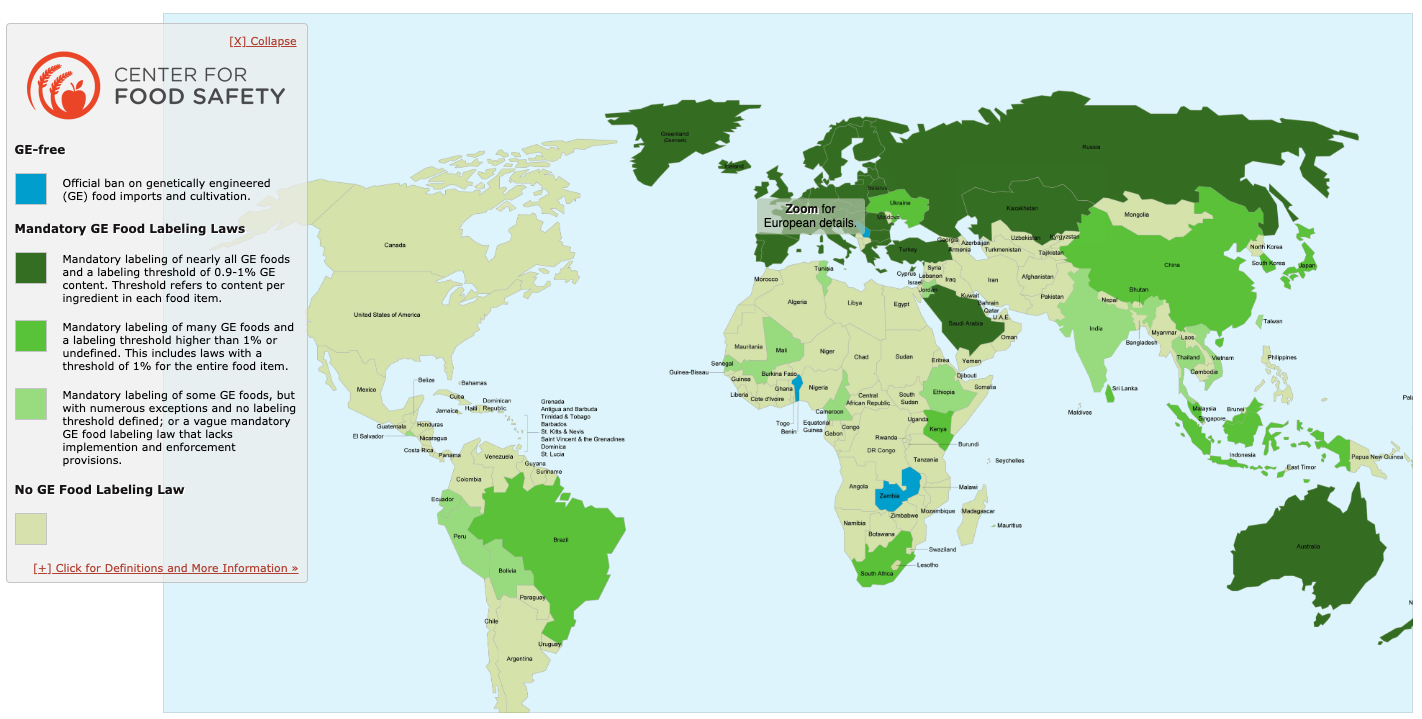Laws on the labeling of genetically modified foods
The following figure shows countries with mandatory laws on the labeling of genetically modified foods (dark green) and countries without any laws on the labeling of genetically modified foods.
- Dark green: Mandatory labeling of almost all genetically modified foods and a threshold of 0.9-1% of genetically modified ingredients. The threshold refers to the content per ingredient in each food.
- Green: Mandatory labeling of many genetically modified foods and a labeling threshold of more than 1% or undefined. This includes legislation with a 1% threshold for the whole food.
- Light green: Mandatory labeling of some genetically engineered foods, but with numerous exemptions and no defined threshold; or a vague law on mandatory labeling of genetically engineered foods that lacks implementation and enforcement provisions.
- Blue: Official ban on the import and cultivation of genetically modified foods (GMOs).
- Khaki: No restrictions.
Genetically modified (GM) food has been a hotly debated topic for decades. While proponents emphasise the potential benefits such as increased crop yields and resistance to pests, there are also numerous critics who have various scientific, ethical, environmental and economic concerns. In this blog post, we highlight the main reasons why GM foods are so controversial.
Scientific concerns
Health risks
One of the most commonly cited reasons for scepticism about GM foods is potential health risks. Although many scientific studies have found no clear evidence of health risks, concerns remain that long-term effects may not have been adequately researched. Critics argue that the genetic changes could harbour unknown risks that only become apparent years or decades later.
Allergies
Another scientific aspect is the concern about allergies. Genetic modifications could theoretically introduce new allergens or produce existing allergens in unexpected quantities. This could lead to people who previously had no allergies suddenly becoming allergic to GM foods.
Ethical concerns
Naturalness
Many people reject GM foods on ethical grounds. They feel that the genetic manipulation of plants and animals is unnatural and believe that interfering with genetic material crosses fundamental ethical boundaries. For these people, the principle of naturalness and respect for the integrity of nature is a central argument against GM foods.
Transparency and freedom of choice
Ethical concerns also include the demand for transparency and freedom of choice. Many consumers want to know whether their food is genetically modified so that they can make an informed decision. The demand for clear labelling of GM foods is therefore an important concern to ensure consumer choice.
Ecological concerns
Biodiversity
Ecological concerns often centre on the potential impact of GM crops on biodiversity. Critics fear that GM plants could crossbreed with wild relatives and thereby displace natural species. In the long term, this could lead to a loss of biodiversity, which in turn could have a negative impact on ecosystems.
Development of resistance
Another ecological risk is the possible development of resistance in pests and weeds. The excessive use of GM plants that are resistant to certain pests or herbicides could lead to these pests or weeds also developing resistance. This would require the use of even stronger and potentially more environmentally damaging chemicals.
Economic concerns
Market concentration
Economic concerns often relate to market concentration in the GM seed sector. A few large companies dominate this market, which can lead to dependencies and economic imbalances. Small farmers and growers could become financially dependent on these companies, jeopardising their economic independence.
Costs for farmers
In addition, costs for farmers could increase as they may be forced to buy new GM seeds every year instead of reusing their own seeds. This could represent a considerable financial burden, especially for small farms, and reduce their competitiveness.
Genetically modified food remains a controversial topic that touches on many different aspects. From scientific and health concerns to ethical and environmental issues and economic impacts, the debate is complex and multi-layered. It is important that this debate is based on sound scientific evidence and takes into account the different perspectives in order to make informed decisions about the future of our food and agriculture.
